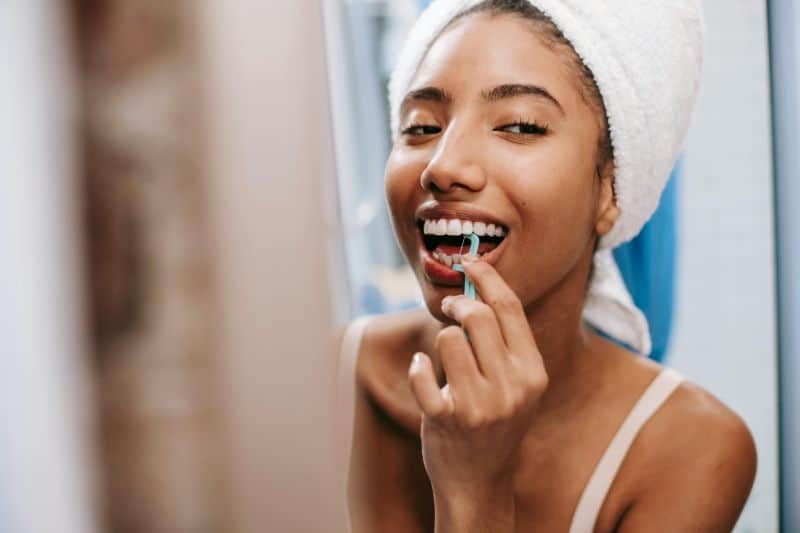
29 Aug The Benefits of Flossing: Why It’s Essential for Oral Health
Flossing is one of those dental habits that many people know they should do but often skip. But what if we told you that this tiny step could be the most powerful addition to your oral hygiene routine? Whether you’re trying to prevent cavities, improve your breath, or protect your heart (yes, your heart!), flossing plays a major role.
It’s more than just removing that popcorn kernel stuck between your molars. Flossing helps remove plaque in areas your toothbrush can’t reach — the tight spaces between your teeth and under the gumline.
In this guide, we’ll explore 21 compelling benefits of flossing daily, bust common myths, and answer FAQs so you can build a sustainable oral care habit.

1. Removes Plaque Buildup Between Teeth
Plaque is a sticky, colorless film of bacteria that forms on your teeth. While brushing clears most of it, toothbrushes can’t reach the narrow gaps between your teeth. That’s where floss shines. By gliding between teeth, floss removes residual food particles and plaque, preventing tartar buildup — which hardens and becomes impossible to remove without professional cleaning.
2. Prevents Gum Disease
Gum disease, or periodontal disease, starts with inflammation caused by plaque under the gumline. If not removed, bacteria can lead to gingivitis — red, swollen gums that bleed easily. Flossing daily removes plaque and bacteria before they cause damage, keeping your gums pink, firm, and healthy.
3. Reduces Risk of Cavities
Cavities often form in tight spots where bacteria feed on food debris and produce acid. Flossing disrupts this process by cleaning those hidden spaces. With less food for bacteria to feed on, your risk of tooth decay decreases drastically.
4. Enhances Fresh Breath
Bad breath (halitosis) often results from decaying food and bacteria stuck between teeth. Even after brushing, if particles remain wedged between molars, the odor lingers. Flossing helps remove these odor-causing agents, leaving your breath noticeably fresher.
5. Supports Overall Health
Multiple studies link gum disease with systemic issues like cardiovascular disease, diabetes, and even Alzheimer’s. Inflammation in the gums can trigger an immune response that impacts the entire body. Flossing, by reducing inflammation, can help lower systemic risk factors and contribute to better overall wellness.
6. Strengthens Gums
Just like your muscles, gums benefit from regular stimulation. Flossing improves blood circulation in the gums, reducing sensitivity and improving resilience. Over time, gums become less prone to bleeding and swelling.
7. Improves Appearance of Teeth
Cleaner gums and less plaque mean your teeth look brighter and more polished. While flossing doesn’t whiten teeth directly, it helps reduce the yellowish appearance caused by plaque buildup.
8. Helps Maintain Dental Work
If you’ve invested in crowns, bridges, implants, or veneers, flossing is crucial. It helps extend the lifespan of these restorations by keeping surrounding areas clean and free of infection.
9. Complements Brushing
Think of flossing as the “partner” to brushing. Brushing cleans the front, back, and chewing surfaces. Flossing cleans what your toothbrush can’t — between teeth and under the gums. Skipping flossing is like washing only half your face.
10. Saves Money on Dental Bills
Preventive care like flossing costs you virtually nothing and saves hundreds (if not thousands) on future dental procedures. By avoiding cavities, root canals, and gum treatments, you significantly reduce dental expenses over time.
11. Helps Detect Oral Problems Early
During flossing, you become familiar with your mouth. You may notice swelling, bleeding, or tenderness, which can signal early signs of dental issues. Early detection often leads to easier and less expensive treatments.
12. Increases Confidence in Social Situations
Knowing your breath is fresh and your teeth are clean can boost your confidence in both personal and professional settings. Flossing contributes to a more polished, self-assured smile.
13. Creates a Consistent Oral Routine
Habits shape health. By adding flossing to your daily routine, you strengthen your commitment to oral care, which can extend into better brushing habits and more consistent dental checkups.
14. Reduces Inflammation and Bleeding
Bleeding gums are often caused by inflammation from plaque and bacteria. Regular flossing reduces this inflammation, making gums healthier and far less likely to bleed during brushing or flossing.
15. Benefits for Orthodontic Patients
People with braces, retainers, or aligners face unique cleaning challenges. Specialized flossing tools, such as floss threaders, help clean around wires and brackets, preventing white spots, decay, and gum problems.

16. Encourages Healthy Habits in Children
Starting flossing early teaches children about lifelong dental hygiene. Fun floss picks and flavored floss make it enjoyable. Plus, kids who floss are more likely to become adults who floss.
17. Decreases Bacterial Overload in Mouth
An unflossed mouth is a playground for bacteria. With less plaque, there’s less food for harmful microbes to grow. Flossing keeps your oral microbiome balanced and healthy.
18. Promotes Whiter Teeth Over Time
Although flossing doesn’t bleach teeth, it helps prevent discoloration by removing stains trapped between them. Over time, this contributes to a brighter, cleaner smile.
19. Environmental and Sustainable Floss Options
Today, you don’t have to sacrifice sustainability for oral care. Options like silk floss, biodegradable corn floss, and refillable floss containers help you reduce plastic waste while maintaining a clean smile.
20. Flossing vs. Other Interdental Cleaners
While tools like water flossers and interdental brushes have their place, traditional floss remains the most effective at scraping off plaque. A combination of tools often yields the best results.
21. Flossing Myths Busted
-
Myth: Flossing isn’t necessary if you brush well.
Truth: Brushing only reaches 60% of your tooth surfaces. -
Myth: Flossing creates gaps in teeth.
Truth: Flossing prevents gums from receding and keeps teeth tight. -
Myth: Flossing is painful.
Truth: If done gently and correctly, it shouldn’t hurt.

FAQs About Flossing
How often should I floss?
Daily. Ideally once per day, preferably at night before bed.
Is it better to floss before or after brushing?
Both methods are effective, but flossing before brushing may help loosen debris and allow fluoride from your toothpaste to reach between teeth.
What type of floss should I use?
Choose floss based on your preferences: waxed, unwaxed, tape, or eco-friendly options. Consistency is more important than type.
Can flossing damage my gums?
Only if done too aggressively. Gentle, consistent flossing strengthens rather than harms your gums.
What if my gums bleed when I floss?
Bleeding often indicates inflammation from plaque. With regular flossing, the bleeding usually stops within a week or two.
Is flossing really necessary if I brush well?
Absolutely. Brushing alone leaves about 40% of surfaces untouched. Flossing completes your cleaning routine.
Conclusion: Flossing Is a Small Habit With Big Benefits
Incorporating flossing into your daily routine may seem like a small act, but it leads to big rewards — fresher breath, stronger gums, fewer cavities, and even better overall health. Whether you’re 8 or 80, flossing is one of the simplest, most affordable ways to protect your smile. So grab your floss, make it a nightly ritual, and smile knowing you’re doing something powerful for your health — one strand at a time.


Sorry, the comment form is closed at this time.